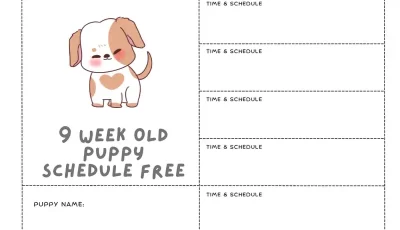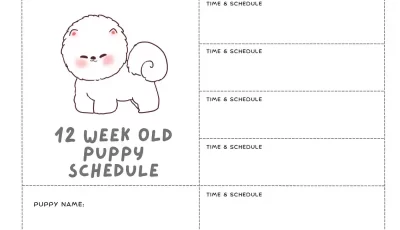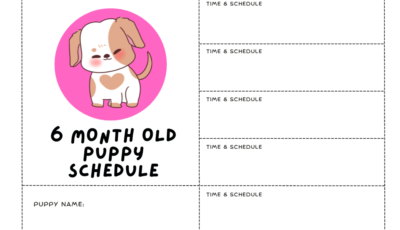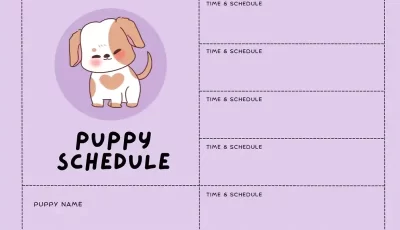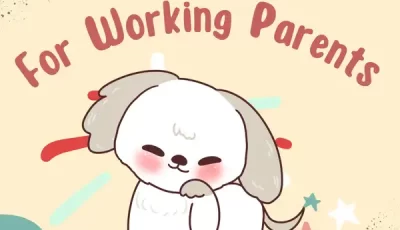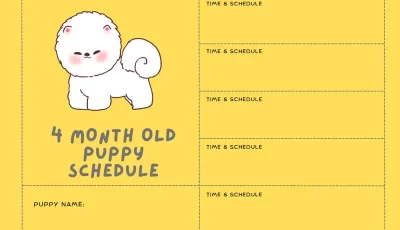The 3 month old puppy schedule can be used to ensure that your pup has a healthy and happy life. It also ensures that they are not over or under-stimulated by the world around them.
Puppies need a lot of attention in the first few months of their lives. They must be trained and exercised regularly to grow into happy and healthy dogs with good manners.
A puppy schedule is a set of guidelines that will help you ensure that your new puppy gets enough sleep, exercise, and training. The 3 month old puppy schedule is designed for the first few months of your pup’s life.
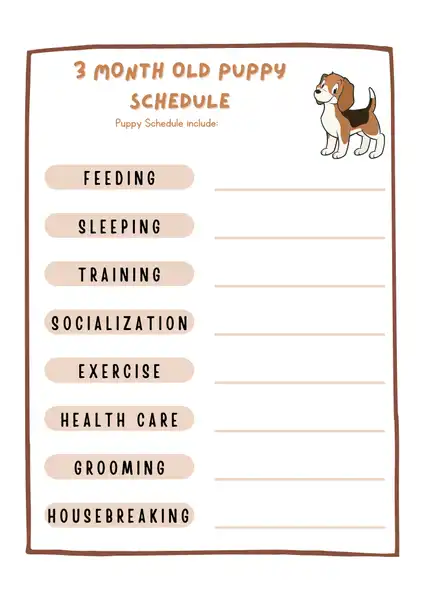
3 Month Old Puppy Schedule
The benefits of crate training your 3 month old puppy
Crate training your puppy can be a daunting task. However, there are many benefits of crate training your 3 month old puppy.
- That will create a sense of security for the dog. A secure dog will less likely to feel anxious and stressed out in different situations.
- It helps the owner have more control over their dog when they are not home or busy doing something else. It also helps keep the house cleaner as dogs will not go potty inside their crates and won’t chew on furniture while they’re.
- Crate training is also beneficial because it creates a space where the dog can get away from everything else around them, giving them a sense of peace and calmness.
- It makes travel with pets much easier as well as makes vet visits easier too since dogs will not try to escape their crates while
The following tips are designed to help you socialize your puppy and make them a well-adjusted member of society.
- Socialization is important for your puppy’s health and development.
- Puppies are more likely to develop a fear of humans when they are not socialized early on.
- Puppies who are not socialized may also be more likely to bite people, even as adults.
- Socializing your puppy is easy and fun!
- You can find resources at the end of this article to help you start socializing your puppy and teaching them basic commands like “sit” or “stay.”
The Importance of Obedience Training for Your 3 month old Puppy
Training your puppy is important for a variety of reasons. It helps the owner and dog bond, teaches the dog boundaries, and helps them learn how to behave in certain situations.
Many different training techniques can be used to train a puppy. One of the most popular techniques is “positive reinforcement training” or “operant conditioning.” This technique relies on positive reinforcement to teach your dog new behaviors. For example, if you want your dog to sit when they hear a sound, you can reward them with a treat when they do so successfully.
This type of training aims to encourage desired behaviors by rewarding them with something the animal enjoys (positive reinforcement). The goal is never punishment or force (negative reinforcement).
Troubleshooting common problems with 3 month old puppies
A 3 month old puppy should be fully vaccinated so it is unlikely to catch a disease. However, other issues can arise. For example, if a puppy has diarrhea for over three days, it could be a sign of an intestinal parasite or a food allergy.
If diarrhea persists for more than three days and is not caused by either of these two things, they should see their vet as soon as possible to get treatment.
The importance of Exercise for your 3 month old puppy
Dogs are pack animals and need to be active to stay healthy. This is why taking your pup for a walk every day is important.
When you walk your pup, you are not only getting him the exercise he needs, but you’re also bonding with him and teaching him some manners. A good walk will tire your pup out so that he sleeps better at night, which is good for both of you!
Read Also : How to Create a Perfect 5 Month Old Puppy Schedule
Feeding times for a 3 month old puppy
Puppies need to eat three times a day. Feeding time will be different depending on the puppy’s size and metabolism. The feeding times are usually between 4-8 hours apart.
Sleep schedule for a 3 month old puppy
Generally, 3 month old puppies need about 15-18 hours of sleep daily.
Puppies must learn to sleep independently and not depend on their owners for comfort.
To do so, they must be taught how to go into a crate or bed alone when sleepy instead of relying on you to put them in there during the night.
It is also important that they are not disturbed while sleeping as this can cause anxiety and stress, resulting in nightmares or separation anxiety later in life.
Grooming schedule for a 3 month old puppy
A 3 month old pup will need to be groomed every week. This includes brushing the coat and trimming the nails.
It would help if you also washed the dog’s ears, eyes, and teeth. It is important to keep an eye out for fleas and ticks, which can lead to health problems in older dogs.
Health care schedule for a 3 month old puppy
The puppy will need to be taken to the vet for a health check-up at least once every 3 months.
The puppy needs to be vaccinated against rabies, parvovirus, and distemper. This can be done at the same time as the vet visit.
The puppy needs to have its teeth brushed at least 3 times a week.
The puppy must be given plenty of exercise and socialization with other dogs to grow up well-adjusted and confident.
What are the best toys for a 3 month old puppy?
A 3 month old puppy will be very active and curious. They will also need to chew on things. Toys that are good for this age include:
* Kong toys – these are rubber toys that can be filled with food or treat to keep the puppy busy for hours.
* Nyla bones – these are hard plastic dog chews safe for puppies of this age.
* Rope toys are durable and can be used as a tug-of-war toy or a fetch toy by throwing them across the room.
How to potty train your 3 month old puppy?
Potty training your 3 month old puppy can be a daunting task. Having the right tools and plan is important before starting the training process.
The first step is ensuring you use the right potty for your dog. If you use a litter box, ensure it’s not too deep or narrow. If your dog has an accident in the potty, it may get discouraged and not want to go back there again. The same goes for if they can’t see their reflection in the potty like with a metal bowl – they won’t know what it’s for!
It would help if you also had several potty pads that work best with your dog’s size and temperament. Some dogs prefer cloth pads, while others prefer plastic ones that feel like grass under their paws.
